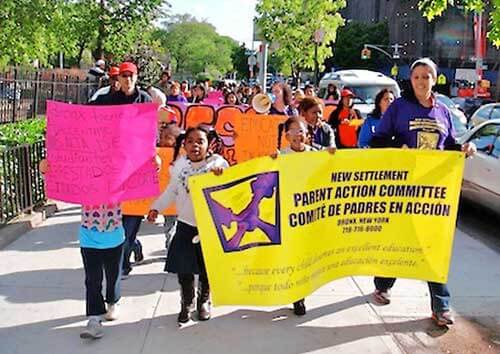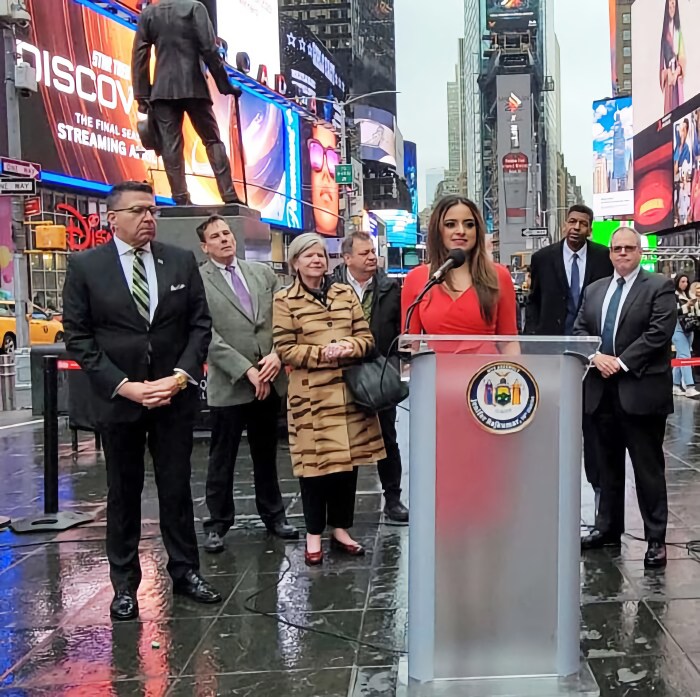Bronx residents are protesting the current New York City Department of Education (DOE) disciplinary polices that have moved children from school directly into the criminal justice system.
On Thursday, May 10, the New Settlement Parent Action Committee assembled more than 100 Bronx parents, students, educators, faith leaders, community organizations, and advocates in a large community march entitled “Education, Not Incarceration!”
Participants of the action released a set of specific demands mandating the use of positive discipline programs and guidance support in all Bronx public schools.
The stops of the community march itself illustrated the trajectory of the school-to-prison pipeline: an early childhood education center; elementary, middle, and high schools; the Bronx Suspensions Hearing Center, and finally Horizon Juvenile Detention Center, all within blocks of each other.
Aminata Sillah, a 15-year-old freshman at local high school Green Dot, reflected on how close to home the issue of youth criminalization hits for her: “Sometimes from school, I can hear the orders given on the bullhorn at Horizon where students like me are jailed, and it makes me think what it would be like to have them in classes here with me instead.”
The Bronx-based groups argue that harsh and punitive disciplinary measures that remove children from the classroom for minor incidents only exacerbate the problem of school pushout, and differentially impact youth of color.
In the last school year, there were more than 73,000 suspensions, with Black students receiving over 50 percent of all suspensions, a rate nearly double their enrollment figures within New York City public schools.
Similarly, in just three months of the current school year, there were 279 school-based arrests made citywide, with an average of more than five arrests of school children per day. The Bronx tops the list, possessing the highest rate of both school-based arrests and summonses.
The DOE’s subcontracting of school safety under the New York Police Department (NYPD) has drawn serious questions about the relationship between the two city agencies as it relates to matters of student discipline.
It is important to understand the magnitude of the NYPD’s current jurisdiction over school safety. The DOE has allotted $300 million annually to the NYPD’s School Safety Division; with more than 5000 agents, the School Safety Division alone is the fifth largest police force in the country.
The prioritization of resources towards school policing as opposed to student social and emotional support, and the most current set of statistics from the Student Safety Act depict the disproportional impact of school-based arrests upon youth of color.
“I think there’s a bit of racism in here – a rose by any other name is still a rose, and in this case, it’s called racism. The DOE needs to get the message that we as parents and community members are responsible for the welfare and the future of our children, and we’re not going to sit back and allow them to be pipelined to prison,” noted Joseph Ferdinand, a leader with the New Settlement Parent Action Committee.
The Bronx-based groups are demanding that the DOE take seriously the urgency around disciplinary practices that are leading students towards incarceration instead of graduation. They are calling on the DOE to do the following:
•Fund and implement positive discipline programs like conflict resolution and peer mediation in all Bronx public schools.
•Invest in social and emotional supports for students by having a sufficient number of guidance staff – at least one guidance counselor per 100 students – as well as a licensed, full-time social worker in all Bronx public schools.
•Reduce the number of suspensions and arrests by 50 percent by September 2013.
Nelson Mar, senior staff attorney and education law specialist with Legal Services NYC – Bronx reaffirmed the importance of mandating the practice of positive disciplinary alternatives across the public schools.
“Evidence based approaches have been shown to be effective in reducing disruptive student behaviors and these approaches include: positive behavior interventions and supports (PBIS); Safe Responsive Schools (SRS) and Restorative Practices.”
In addition to their three-point demands of the DOE, participants of “Education, Not Incarceration!” called on Elayna Konstan, head of the New York City Office of School and Youth Development (responsible for producing and disseminating the Citywide Standards of Intervention and Discipline measures in NYC schools) to attend a People’s Hearing on School Justice.


























